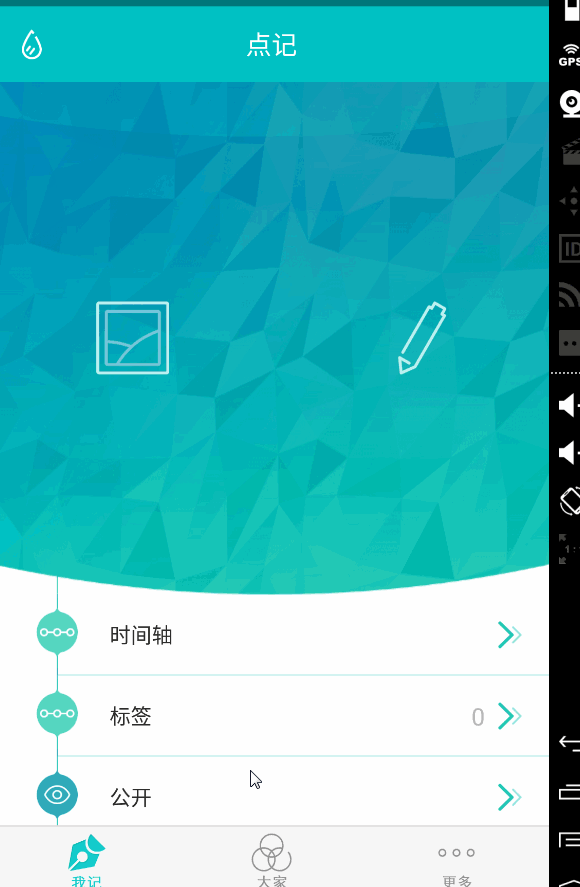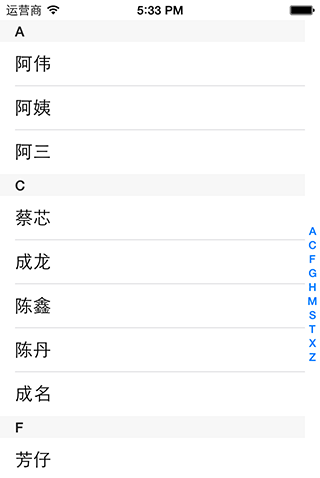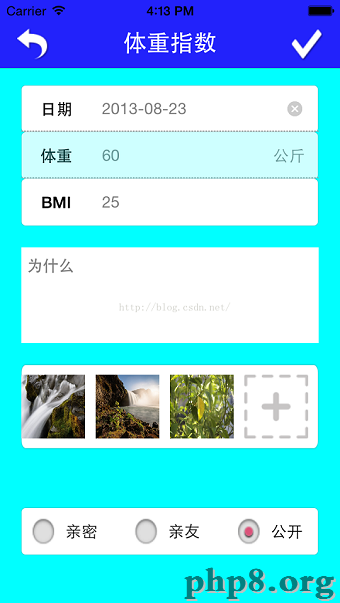仿IOS後果 帶彈簧動畫的ListView
編輯:IOS開發綜合
比來項目盤算做一個界面,相似於dayone首頁的界面後果,dayone 是一款付費運用,今朝只要IOS端。作為一個資深懶散的法式員,奉行的主旨是相對不反復造一個輪子。因而乎,去網上找一年夜堆開源項目,發明沒有找到適合的,然後,只能硬著頭皮本身來了。先看看後果:

後果圖
其實寫起來也比擬簡略,就是掌握ListView的頭部和底部的高度便可以了, 假如用RecycleView完成起來也是一樣,只是RecycleView添加頭和尾巴略微費事一點,處置點擊事宜也不是很便利,所以就基於ListView去完成了。完成的代碼, 我曾經上傳到github上了。
1、應用辦法
compile 'com.a520wcf.yllistview:YLListView:1.0.1
2、應用引見:
1)、結構:
結構留意一個小細節Android:layout_height 最好是match_parent, 不然ListView每次滑動的時刻都有能夠須要從新盤算條目高度,比擬消耗CPU;
<com.a520wcf.yllistview.YLListView Android:divider="@Android:color/transparent" android:id="@+id/listView" android:layout_width="match_parent" android:layout_height="match_parent" />
2)、代碼:
private YLListView listView;
@Override
protected void onCreate(Bundle savedInstanceState) {
super.onCreate(savedInstanceState);
setContentView(R.layout.activity_main);
listView = (YLListView) findViewById(R.id.listView);
// 不添加也有默許的頭和底
View topView=View.inflate(this,R.layout.top,null);
listView.addHeaderView(topView);
View bottomView=new View(getApplicationContext());
listView.addFooterView(bottomView);
// 頂部和底部也能夠固定終究的高度 不固定就應用結構自己的高度
listView.setFinalBottomHeight(100);
listView.setFinalTopHeight(100);
listView.setAdapter(new DemoAdapter());
//YLListView默許有頭和底 處置點擊事宜地位留意減去
listView.setOnItemClickListener(new AdapterView.OnItemClickListener() {
@Override
public void onItemClick(AdapterView<?> parent, View view, int position, long id) {
position=position-listView.getHeaderViewsCount();
}
});
}
3、源碼引見
其實這個項目外面只要一個類,年夜家不須要依附,直接把這個類復制到項目中便可以了,來看看源碼:
package com.a520wcf.yllistview;
import android.content.Context;
import android.util.AttributeSet;
import android.view.MotionEvent;
import android.view.View;
import android.view.ViewTreeObserver.OnGlobalLayoutListener;
import android.view.animation.DecelerateInterpolator;
import android.widget.AbsListView;
import android.widget.ListView;
import android.widget.Scroller;
public class YLListView extends ListView implements AbsListView.OnScrollListener {
private Scroller mScroller; // used for scroll back
private float mLastY = -1;
private int mScrollBack;
private final static int SCROLLBACK_HEADER = 0;
private final static int SCROLLBACK_FOOTER = 1;
private final static int SCROLL_DURATION = 400; // scroll back duration
private final static float OFFSET_RADIO = 1.8f;
// total list items, used to detect is at the bottom of ListView.
private int mTotalItemCount;
private View mHeaderView; // 頂部圖片
private View mFooterView; // 底部圖片
private int finalTopHeight;
private int finalBottomHeight;
public YLListView(Context context) {
super(context);
initWithContext(context);
}
public YLListView(Context context, AttributeSet attrs) {
super(context, attrs);
initWithContext(context);
}
public YLListView(Context context, AttributeSet attrs, int defStyle) {
super(context, attrs, defStyle);
initWithContext(context);
}
private void initWithContext(Context context) {
mScroller = new Scroller(context, new DecelerateInterpolator());
super.setOnScrollListener(this);
this.getViewTreeObserver().addOnGlobalLayoutListener(
new OnGlobalLayoutListener() {
@Override
public void onGlobalLayout() {
if(mHeaderView==null){
View view=new View(getContext());
addHeaderView(view);
}
if(mFooterView==null){
View view=new View(getContext());
addFooterView(view);
}
getViewTreeObserver()
.removeGlobalOnLayoutListener(this);
}
});
}
@Override
public boolean onTouchEvent(MotionEvent ev) {
if (mLastY == -1) {
mLastY = ev.getRawY();
}
switch (ev.getAction()) {
case MotionEvent.ACTION_DOWN:
mLastY = ev.getRawY();
break;
case MotionEvent.ACTION_MOVE:
final float deltaY = ev.getRawY() - mLastY;
mLastY = ev.getRawY();
if (getFirstVisiblePosition() == 0 && (mHeaderView.getHeight() > finalTopHeight || deltaY > 0)
&& mHeaderView.getTop() >= 0) {
// the first item is shoWing, header has shown or pull down.
updateHeaderHeight(deltaY / OFFSET_RADIO);
} else if (getLastVisiblePosition() == mTotalItemCount - 1
&& (getFootHeight() >finalBottomHeight || deltaY < 0)) {
updateFooterHeight(-deltaY / OFFSET_RADIO);
}
break;
default:
mLastY = -1; // reset
if (getFirstVisiblePosition() == 0 && getHeaderHeight() > finalTopHeight) {
resetHeaderHeight();
}
if (getLastVisiblePosition() == mTotalItemCount - 1 ){
if(getFootHeight() > finalBottomHeight) {
resetFooterHeight();
}
}
break;
}
return super.onTouchEvent(ev);
}
/**
* 重置底部高度
*/
private void resetFooterHeight() {
int bottomHeight = getFootHeight();
if (bottomHeight > finalBottomHeight) {
mScrollBack = SCROLLBACK_FOOTER;
mScroller.startScroll(0, bottomHeight, 0, -bottomHeight+finalBottomHeight,
SCROLL_DURATION);
invalidate();
}
}
// 盤算滑動 當invalidate()後 體系會主動挪用
@Override
public void computeScroll() {
if (mScroller.computeScrollOffset()) {
if (mScrollBack == SCROLLBACK_HEADER) {
setHeaderHeight(mScroller.getCurrY());
} else {
setFooterViewHeight(mScroller.getCurrY());
}
postInvalidate();
}
super.computeScroll();
}
// 設置頂部高度
private void setHeaderHeight(int height) {
LayoutParams layoutParams = (LayoutParams) mHeaderView.getLayoutParams();
layoutParams.height = height;
mHeaderView.setLayoutParams(layoutParams);
}
// 設置底部高度
private void setFooterViewHeight(int height) {
LayoutParams layoutParams =
(LayoutParams) mFooterView.getLayoutParams();
layoutParams.height =height;
mFooterView.setLayoutParams(layoutParams);
}
// 獲得頂部高度
public int getHeaderHeight() {
AbsListView.LayoutParams layoutParams =
(AbsListView.LayoutParams) mHeaderView.getLayoutParams();
return layoutParams.height;
}
// 獲得底部高度
public int getFootHeight() {
AbsListView.LayoutParams layoutParams =
(AbsListView.LayoutParams) mFooterView.getLayoutParams();
return layoutParams.height;
}
private void resetHeaderHeight() {
int height = getHeaderHeight();
if (height == 0) // not visible.
return;
mScrollBack = SCROLLBACK_HEADER;
mScroller.startScroll(0, height, 0, finalTopHeight - height,
SCROLL_DURATION);
invalidate();
}
/**
* 設置頂部高度 假如不設置高度,默許就是結構自己的高度
* @param height 頂部高度
*/
public void setFinalTopHeight(int height) {
this.finalTopHeight = height;
}
/**
* 設置底部高度 假如不設置高度,默許就是結構自己的高度
* @param height 底部高度
*/
public void setFinalBottomHeight(int height){
this.finalBottomHeight=height;
}
@Override
public void addHeaderView(View v) {
mHeaderView = v;
super.addHeaderView(mHeaderView);
mHeaderView.getViewTreeObserver().addOnGlobalLayoutListener(
new OnGlobalLayoutListener() {
@Override
public void onGlobalLayout() {
if(finalTopHeight==0) {
finalTopHeight = mHeaderView.getMeasuredHeight();
}
setHeaderHeight(finalTopHeight);
getViewTreeObserver()
.removeGlobalOnLayoutListener(this);
}
});
}
@Override
public void addFooterView(View v) {
mFooterView = v;
super.addFooterView(mFooterView);
mFooterView.getViewTreeObserver().addOnGlobalLayoutListener(
new OnGlobalLayoutListener() {
@Override
public void onGlobalLayout() {
if(finalBottomHeight==0) {
finalBottomHeight = mFooterView.getMeasuredHeight();
}
setFooterViewHeight(finalBottomHeight);
getViewTreeObserver()
.removeGlobalOnLayoutListener(this);
}
});
}
private OnScrollListener mScrollListener; // user's scroll listener
@Override
public void setOnScrollListener(OnScrollListener l) {
mScrollListener = l;
}
@Override
public void onScrollStateChanged(AbsListView view, int scrollState) {
if (mScrollListener != null) {
mScrollListener.onScrollStateChanged(view, scrollState);
}
}
@Override
public void onScroll(AbsListView view, int firstVisibleItem,
int visibleItemCount, int totalItemCount) {
// send to user's listener
mTotalItemCount = totalItemCount;
if (mScrollListener != null) {
mScrollListener.onScroll(view, firstVisibleItem, visibleItemCount,
totalItemCount);
}
}
private void updateHeaderHeight(float delta) {
setHeaderHeight((int) (getHeaderHeight()+delta));
setSelection(0); // scroll to top each time
}
private void updateFooterHeight(float delta) {
setFooterViewHeight((int) (getFootHeight()+delta));
}
}
以上就是本文的全體內容,願望對年夜家的進修有所贊助。
【仿IOS後果 帶彈簧動畫的ListView】的相關資料介紹到這裡,希望對您有所幫助! 提示:不會對讀者因本文所帶來的任何損失負責。如果您支持就請把本站添加至收藏夾哦!
相關文章
+



